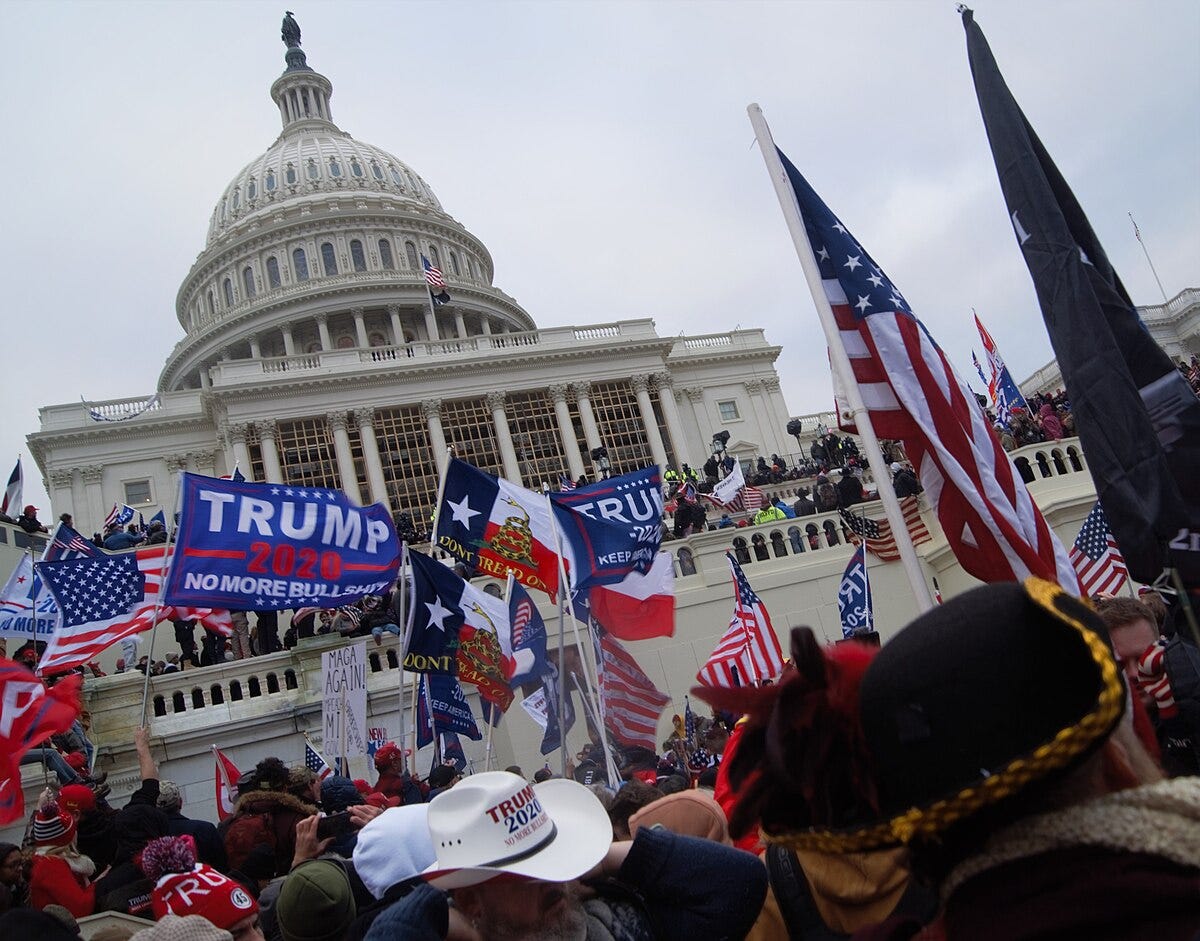Why Republicans Desperately Want to Rewrite the History of January 6
GOP committees elevate pardoned Capitol rioters as fundraising draws, rewriting a violent riot as peaceful protest while obscuring accountability and eroding their own 'law and order' message.
The images broadcast live on television the afternoon of January 6, 2021, were surreal. Protests on the Washington Mall and marches to Capitol Hill are commonplace, but this event was different. Whether it meets the strict definition of insurrection is debatable, but it was unquestionably a riot during which numerous laws were broken, including assaults on more than 100 police officers.
The reframing of January 6 and its participants is disturbing enough without Republicans elevating convicts into celebrities with heroic stories to tell.
Republicans are spotlighting individuals convicted of crimes related to the assault on the Capitol to raise money for regional committees. They’re inviting pardoned rioters to tell "their side of the story," frequently depicting the event as a peaceful protest marred by a few bad actors, which led the federal government to clamp down on free speech and aggressively prosecute innocent bystanders.
In pardoning more than 1,500 individuals convicted of January 6-related crimes, former President Donald Trump asserted they were unfairly treated and undeserving of punishment. Extreme conservatives, such as Georgia Rep. Marjorie Taylor Greene, have labeled incarcerated rioters "political prisoners."
According to The Wall Street Journal, local and regional Republican committees are inviting convicted January 6 participants to fundraisers, accurately calculating their appeal to donors eager to recast the day's events as something other than a violent riot aimed at disrupting the certification of President Joseph Biden’s election.
One GOP fundraiser in Utah featured Treniss Evans, convicted of illegally entering the Capitol. Prosecutors provided photos showing Evans drinking Jack Daniels and Fireball whiskey in former House Speaker Nancy Pelosi’s office. Evans was among the hundreds who breached barriers. Prosecutors said Evans attacked a Capitol Police officer with a wooden flagpole.
Evans, however, insists those entering the Capitol were peaceful protestors exercising free speech, claiming government overreach: "This was not an insurrection. This was Kent State. This was Tiananmen Square," he remarked.
When I joined the Army, my grandfather offered sage advice: "Believe nothing you hear and only half of what you see." Even if we believe only half of what we witnessed that day, those convicted deserved their punishment.
We saw rioters breaking fences, assaulting officers, smashing windows, invading the Senate chamber, chasing lawmakers, stealing furniture, and vandalizing offices. One rioter allegedly defecated on Pelosi’s desk—hardly the hallmark of a peaceful protest.

One rioter, former Air Force officer Ashli Babbitt, was killed by security as she attempted to breach a protective barrier. Her family and MAGA supporters view her death differently, making her a martyr. The family sued the government for wrongful death—a case that would likely have been dismissed outright—but the Trump administration settled, awarding her family $5 million.
Dismiss the "Bipartisan Committee" investigating January 6 as biased if you wish, but numerous government and independent investigations reached similar conclusions: the events constituted a violent attempt to disrupt democratic processes. Republicans seek desperately to rewrite January 6 history, avoiding accountability and contradictions between their rhetoric and actions.
Trump and Republicans proclaim themselves champions of law and order, equating respect for police with respect for law. Trump even deployed troops to Los Angeles to protect law enforcement officers during protests, stating anyone assaulting officers would face severe repercussions.
Yet, regarding January 6, many Republicans turn away. They ignore dozens of officers assaulted, injured, and traumatized. They overlook rioters wielding weapons against Capitol defenders. They excuse the participants' violence.
Though many expected Trump would pardon select rioters symbolically, Attorney General Pam Bondi promised individual reviews. Let’s concede that some government actions might have been excessive, warranting careful consideration. Yet Trump bypassed this cautious approach, issuing blanket pardons simply because the rioters were his supporters.
January 6 was neither Kent State nor Tiananmen Square. The government didn’t march on the people; the people marched on the government. Republicans and MAGA supporters can spin stories and exploit narratives for fundraising, but they cannot alter historical facts. They own January 6, and their desperation to rewrite it speaks volumes.






To the degree that the coup could not be advanced by the insurrection that day, the question is left open as to whether there was an insurrection, at all (as you note). However, just as there is a difference between a battle and a war, now that the coup is much closer to complete, the answer to the prior question is clear--it was NOT an insurrection. It was a harbinger of the new law and order. That old one rested on citizen juries and institutions, whereas this new one runs around who you know. Those folks on January 6 know a guy, so it's all okay.
Important framing here—but let’s not mistake this for just a PR revision or base pandering.
What we’re watching is narrative infrastructure being laid—purposefully. If January 6 can be recast as 'peaceful protest', not riot (or even insurrection), then future disruptions can be framed as patriotic interventions before they even occur.
We aren't witnessing a branding problem; it’s a strategic repositioning of violence as legitimate political expression when it serves the purpose of the power-hungry party.
The contradiction in “law and order” isn’t just hypocrisy—it’s a selective standard: law applies when it disciplines the other side; it gets waived when loyalty’s involved. Look at how willingly POTUS '45-47' turns on his supporters when they voice dissent. This isn't a policy position; it’s institutional corrosion in real time.
What concerns me most isn’t just the rhetoric, it’s the scaffolding being built to make future accountability impossible. Once you start elevating convicted rioters as truth-tellers and leveraging them for fundraising, you're not rewriting history. You're writing permission slips.